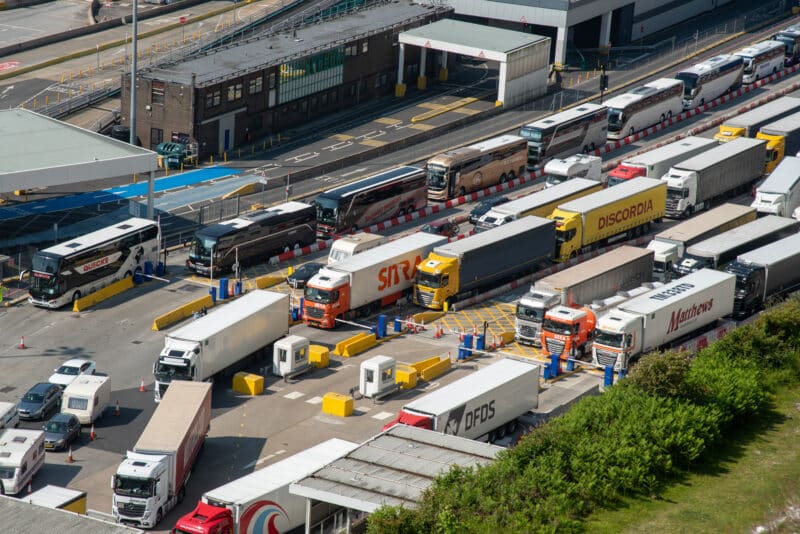From April 30, British Border Controls on EU Food Begin – Four Years Post-Brexit, Delayed Five Times. To Counteract Inflation Rise Due to Expected Increase in Food Prices, Britons Introduce Reliefs on Other Product Categories.
– New border controls will largely be offset by aggressive measures to suspend tariffs down to zero across many product categories.
– More than four years after Brexit, border controls on the import of agricultural products from the EU will finally be implemented on April 30, costing British importers (and customers) GBP 2 billion, potentially raising inflation by +0.15 percentage points.
– At the same time (as of now), the United Kingdom has announced a large-scale suspension of tariffs on nearly half of its imports for a two-year period. This clever countermeasure could reduce the total cost of imports by GBP 7 billion, consequently reducing inflation by -0.6 percentage points.
– Summing up the topic of British inflation: Allianz Trade’s earlier forecast for UK inflation was 2.6% in 2024 and 2.2% in 2025, after 6.9% in 2023. Considering both the mentioned changes related to imports to the UK – one raising inflation and the other lowering it (both tariffs and similar non-tariff measures such as controls, procedures, etc.), Allianz Trade now expects inflation in the United Kingdom to be 2.4% in 2024 and 2.0% in 2025 (assuming all other factors remain unchanged).
More than four years after Brexit, border controls on the import of agricultural products from the EU will finally be implemented on April 30, costing British importers GBP 2 billion and potentially raising inflation by +0.15 pp. Equivalent border controls concerning imports of agricultural products from the EU had already been delayed five times and will finally come into effect at the end of this month. Physical checks, health certificates, and pre-entry identification to the UK will apply to the import of agricultural products from the EU valued at GBP 21 billion (details on the next page), which represents 3% of all UK imports and close to 8% of imports from the EU. According to the European Commission, this will mean a tariff equivalent increase on EU food by 10%[1] or GBP 2 billion for companies, which will not be amortized by the GBPEUR exchange rate (expected to remain essentially stable at about 1.18). Considering: (i) 30% import intensity; (ii) that their weight in the UK CPI basket is about 6%; (iii) that imports of these goods from the EU constitute about 75% of the total UK imports; and (iv) that companies completely pass on costs (to customers), Allianz Trade expects an increase in inflation in the UK by +0.15pp over 12 months, with the greatest price increase affecting dairy, meat, and fish products.
Products Subject to Border Controls on Imports from the EU
| UK Imports from the EU (GBP billions) | |
| Processed products of cereals, flour, starch or milk; confectionery products | 5.0 |
| Meat and edible meat offal | 4.4 |
| Dairy produce; bird eggs; natural honey; edible products of animal origin | 3.5 |
| Processed products of meat, fish, crustaceans, molluscs, or other aquatic invertebrates | 2.7 |
| Residues and waste from the food industries; prepared animal feed | 1.9 |
| Animal or vegetable fats and oils and their cleavage products; prepared edible fats | 1.4 |
| Live trees and other plants; bulbs, roots, and the like; cut flowers and ornamental foliage | 1.2 |
| Live animals | 0.6 |
| Fish and crustaceans, molluscs, and other aquatic invertebrates | 0.2 |
| Animal products not elsewhere specified or included | 0.1 |
| Total | 21.0 |
*Sources: ITC, Allianz Research*
At the same time (according to current plans) the United Kingdom will decide to suspend tariffs on a large scale for a two-year period for nearly half of its imports. This clever counterattack might reduce total import costs by GBP 7 billion, and as a result, help reduce inflation by -0.6 pp. After 245 applications for tariff suspensions by the private sector, the UK government decided to introduce a temporary suspension of tariffs on specified goods not covered by free trade agreements (from countries with Most Favored Nation WTO status). This represents over 45% of the total UK imports valued at GBP 300 billion, which will overnight transition from an average trade-weighted tariff of 3.2% to zero. The suspension includes mineral fuels, metals, automobiles (previously 6.2% average tariff), natural pearls and precious stones (previously 1.3% average tariff), and several agricultural and food products (previously 12.2% tariff). Utilizing the difference in tariffs, the intensity of imports, the share of each product’s imports, and their respective weight in the UK inflation basket, we calculate that this measure will provide a welcome cost relief for British importers worth GBP 7 billion and potentially lead to a reduction in consumer inflation by -0.6 percentage points over 12 months (assuming corporations pass the entire benefit of reduced tariffs onto their customers (good luck!)).
In summary: Previously, Allianz Trade expected inflation in the United Kingdom to be at 2.6% in 2024 and 2.2% in 2025, after 6.9% in 2023. Now, considering the implementation of both measures related to import costs, inflation in the United Kingdom could even be lower, estimated at 2.4% in 2024 and 2.0% in 2025 (assuming all other potentially influencing factors remain unchanged).
*[1] Impact of the Services Directive on the economy: First assessment after implementation.*
